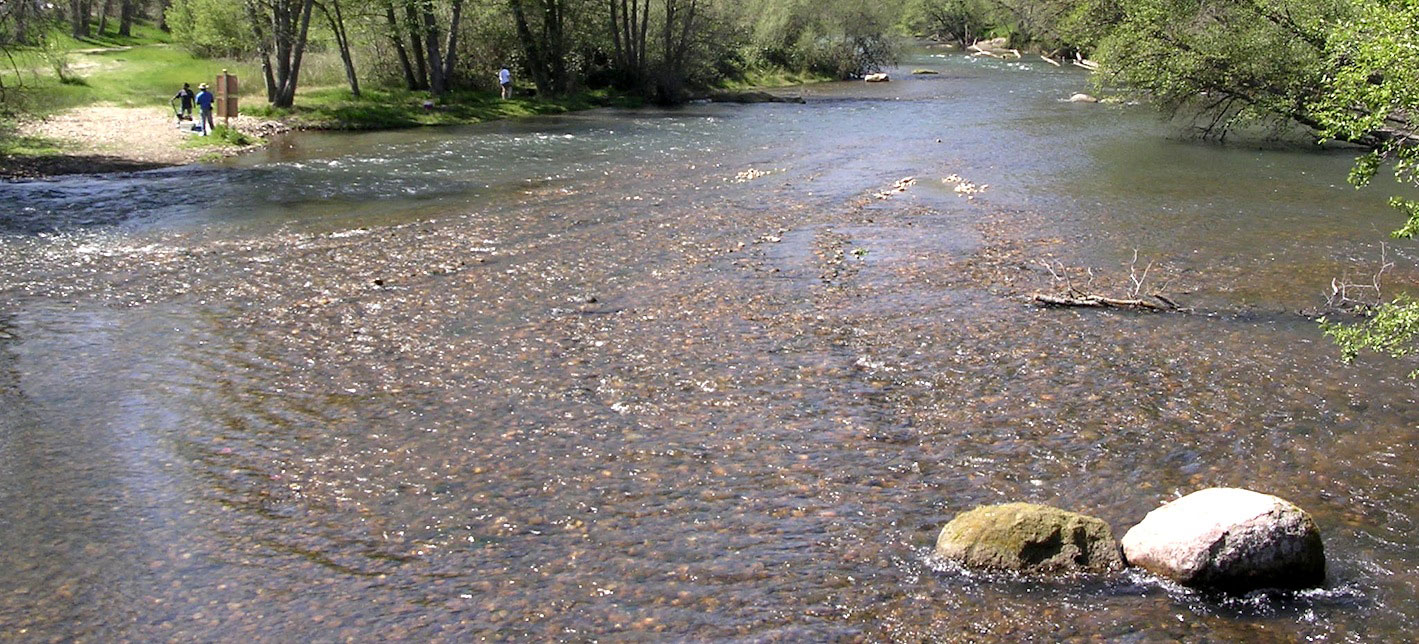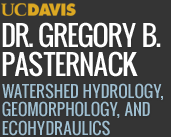ESM 125: River Conservation
The entire website for this course constitutes the official syllabus for the course that faculty are supposed to provide students within the first week of class.
Quarter offered:
Winter quarter of odd numbered years. (2023, 2025, etc)
Day/Time:
MWF 10:00-10:50 am
Instructor:
Prof. Greg Pasternack, Department of Land, Air, and Water Resources
Course Description:
Law, policy, science, and practice used in managing rivers with the aim of balancing human societal needs and those of riparian and aquatic species.
Prerequisites:
Any one of the following or consent of instructor: ECI40, ECI100, ESP1, ESP100, ESP110, ESM 100, ESM 108, ESM 120, ESM 121, EVE101, GEL 1, GEL 50, HYD10, HYD 141, HYD143, SSC 100, WFC10, WFC51.
Student Learning Objectives:
- Student can perform hydrologic, geomorphic, and habitat analyses of a river by segment to assess conditions relevant for river conservation using basic data collection, analysis, and interpretation procedures.
- Student can compare and contrast river conservation perspectives held by different stakeholders, including government, non-government, and independent expert examples.
- Student can trace societal goals (expressed in laws and regulations) for river conservation to practical management approaches that achieve those goals.
- Student can creatively conceive of a scientific experiment in hydrology and communicate the essential elements of the scientific method associated with a proposed experiment through writing and public speech.
Course Reader:
As a cost saving measure for students, I have carefully selected documents for you to read each week that meet course educational goals but at no cost. My goal is to have an average of 10 pages of reading a week, but some weeks it is more or less than that.
All readings are provided for free on the course Canvas site in the Files section. The full list of readings is provides on the readings web page, organized by week.
Software
All UC Davis students are eligible for Microsoft Office while they are enrolled at UCD. To obtain it, go to this link: https://officedownload.ucdavis.edu
Word Processing
This course requires the use of a Word processing program. Microsoft Word is recommended as the most common one used in professional business and science. The free alternative, the Open Office suite can work. Online word processors may or may not work depending on their ability to allow you to import high-quality graphics and tables form other programs. There are many other possibilites available, but the one you choose must meet the following criteria:
- The program must be sophisticated enough that it can use or import a Microsoft Word file to use as a report template- or you can take the time on your own to create an equivalent template.
- The program must be sophisticated enough that it is possible to paste data tables and figures into it, preferably in native vector format, but at least in image format. if you choose image formatting for all non-text content, you are required to paste imagesin at a high enough resolutioon that all content can easily be read and intepreted.
Spreadsheeting
There are many spreadsheet programs and programming languages available to work with data on computers and other electronic devices. While many options can do similar functions and analyses, they all have somewhat “workflows”. A workflow is the sequence of steps to accomplish a data analysis goal. It is not possible to write out all variants of workflows for all possible software. By far, Microsoft Excel is the dominant spreadsheet program in use in professional business and science today. Therefore, this course will provide workflows for this software. MS Excel is not free, in general, but is free for you as a UCD student. If you choose to use another spreadsheet program (such as Apache Open Office), then that is ok, but you have to figure out your own workflows to conduct the assignments OR make arrangements to use a computer that *does* have MS Excel on it.
Video Podcasts
This course provides most of the faculty and guest lecturer presentations as online video podcasts and/or Zoom presentations. Sometimes new recordings may need to be made. If so, we adhere to the following guildelines:
- We WILL be recording Zoom sessions when they involve presentations, but not when/if they involve student/class interactive activities.
- You are NOT required turn on your video. For discussion, it helps and is preferable, but it is more important for people to be comfortable. Audio is enough for good conversation.
- Please use your real name in Zoom to identify yourself to the insuctor and classsmates.
- Respect for privacy is an essential part of our classroom community. Images, text, screenshots, audio/video content from Zoom sessions may only be used for instructional purposes of this course. Participants should not distribute data captured from Zoom sessions to anyone outside the course, without appropriate consent from the individuals whose images/voice/data are involved. Unauthorized distribution or capture outside the course may violate federal or state privacy laws or University of California policies. This means, for instance, you should not post screenshots of your class, your instructor, or your classmates to social media.
- Recording is only permitted by the instructor, by Letter of Accommodation issued by the Student Disability Center, or with instructor approval. If recording, the instructor will provide advance notice to participants of an intent to record a session, with an opportunity for students to petition theinstructorsforanopt-outofvideo/audioparticipation. Opt-out requests will be granted at the discretion of the instructor or a campus-designated office, only if the students demonstrate a reasonable basis for declining video or other participation.
- Students should not save or record classroom chat exchanges, including photographing, screen capture, or privately saving chat exchanges, without explicit instructor permission.
Copyright Greg Pasternack 2020.
All federal and state copyrights reserved for all original material presented in this course through any medium, including lecture or print. Individuals are prohibited from being paid for taking, selling, or otherwise transferring for value, personal class notes made during this course to any entity without the express written permission of Greg Pasternack. In addition to legal sanctions, students found in violation of these prohibitions may be subject to University disciplinary action.


